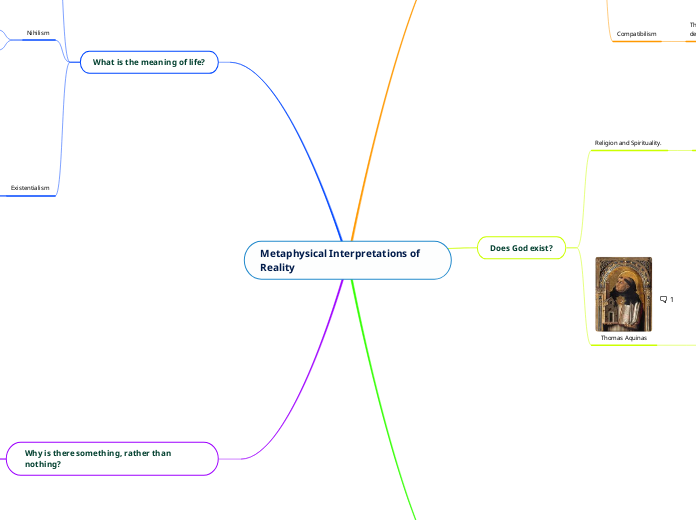av Maddi Grace 2 år siden
203
Metaphysical Interpretations of Reality

av Maddi Grace 2 år siden
203

Mer som dette
All possible world really exist (multiverse)
Reality is actually as full as it could possibly be, as far removed from nothingness as possible
A vacuum of nothingness blowup creating the universe
Depends on the physicals laws being exact laws and not patterns that may stray and change
Orthodoxic christen philosopher. he proposed that god created the universe out of nothing
God + Nothing = Universe
(how did God come to be?)
Sense there is no teleology the world was not created for a reason, and it does not exists for a reason.
We are painfully free. if there is no guideline for our actions, then we must each design our own moral compass
Not always synonyms with atheisms
He asked what if we exists first?, what if we are not born with an essence but rather we find it later?
We are condemned to be free
The purpose of life is to live authentically. Any meaning your life has is given to it by you.
Everything has an essence. A certain set of core properties that are necessary for a thing to be what it is. Everything, Including us.
Our Essence is the purpose/meaning of our life
physical objects that have causal powers, are located in space and time, belong to natural kinds, and interact causally with each other in various natural kinds of ways.
This does not mean that the world defiantly doesn't exists but rather that it may or may not
No one has a God-eye view in order to confirm
Aquinas believed that a infinite regress is inconceivable and impossible.
Theological Argument/Intelligent design Popularized by William Paley
The Watchmaker Analogy
If you stumbled upon a watch in the woods would you assume 1 that it spontaneously appeared on its own or 2 see the complexity of it, its parts are put together in order to tell the time And so it is reasonable to believe that the watch was made by something/someone Someone designed the watch in a way so that it can tell the time God designed the world for [A reason unknown to use but theoretically there is a reason]
The purposefulness of a watch leads use to believe of a watch maker and so the purposefulness of the world should lead us to believe in a world maker [God] [Watch = Watchmaker] = [Word = World maker]
Argument from Degrees
Properties come in degrees (a 12 inch dog is small but a 12 inch rat is huge) in order for there to be degrees of perfection, there must be something against which everything can be measured God is the pinnacle of perfection
Argument for Contingency
There are contingent things Contingent things can cause other contingent things But there can not only be contingent things because that would mean that there is a infinite regression of contingency, and possibility that nothing might have existed an infinite regress is impossible and so there for at least one thing must be necessary, God
Argument for Causation
Somethings are caused everything that is caused must be caused by something else There can't be an infinite regress of cause So there must have been a first causer, itself uncaused, and that is God
Argument for Motion
We live in a world in which things are moving Movement is caused by movers Everything moving must be set into place by something else moving Something must have started the movement in the first place
His proposed ontological arguments: "[God is] that then which no greater can be conceived" And so must exist. He reasoned can exist as strictly in our mind/imaginary or it can exist both in our minds and reality. Any good thing is better if it exists in our mind and in reality If god existed only in our mind he could not be the best thing we could think of because god in reality would be better.
What is the difference between someone jumping in the pool and some being pushed in the pool, if the result is the same. in both cases the action is determined. But when an action of an agent is self-determined it could be considered free will.
This view holds people morally responsible sometimes
Harry Frankfurt Frankfurt cases: An agent in some cases, can be mortally responsible even when he could not have done otherwise
Principle of alternate: possibilities: an action is free only if the agent could have done otherwise.
Agent causation: An agent (person) being propelled by a mind can start a chain without having been propelled by anything else.
The physical world is deterministic
"Everything is the inevitable result of what came before. Including what we do"
We believe we have free will because our minds tell us we have free will but: Mental state = Brain state = biological state And biological states are physical states and the physical world is deterministic
Nothing other then what does occur can occur
Event causation: no event can occur without having been caused by a previous event.
No free will
All actions are predetermined. the difference between physicals actions and human actions is that human actions are determined by many invisible factors. Beliefs+ Desires + Temperament = Human action